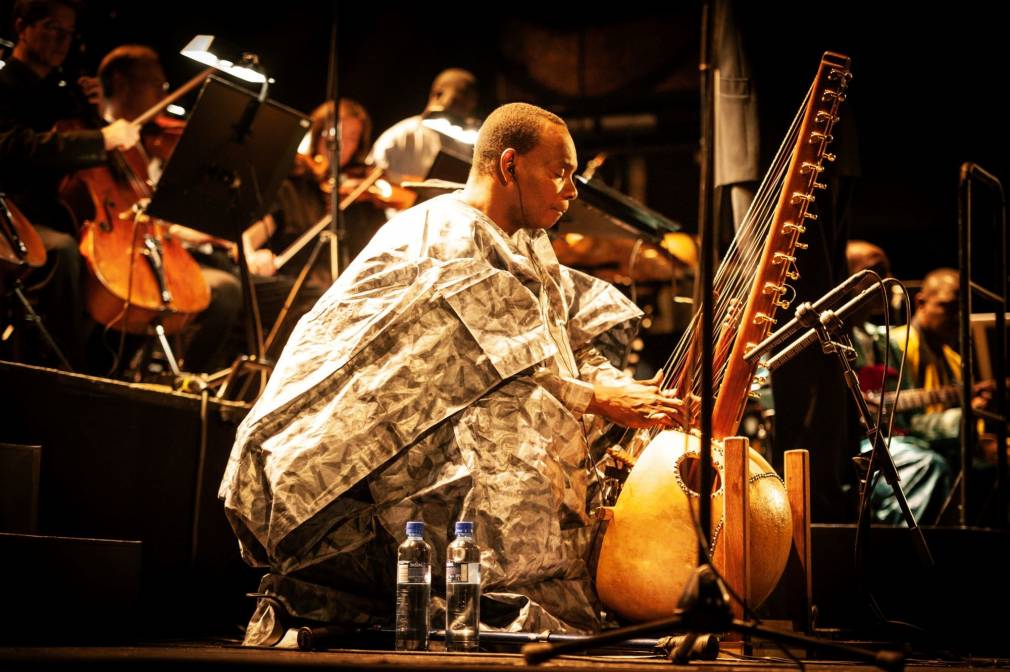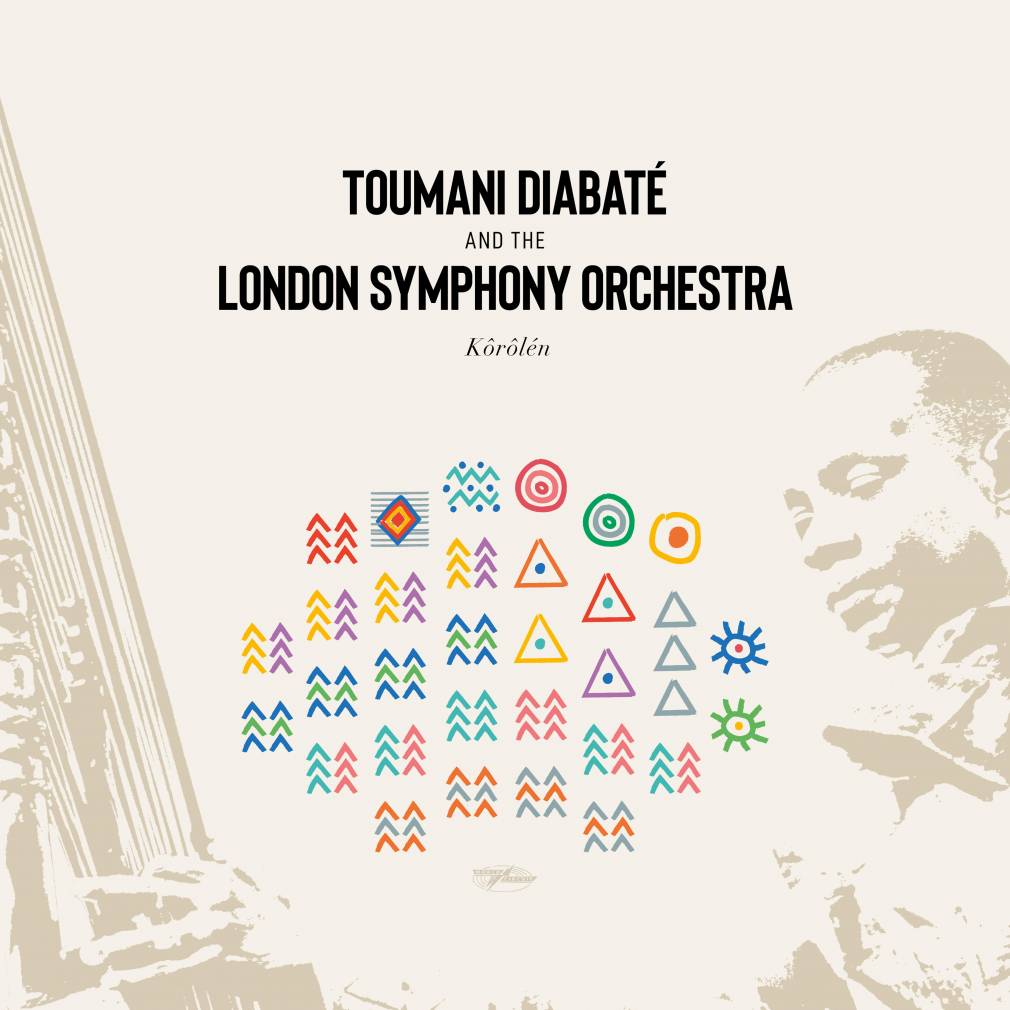The griot master and one-man orchestra Toumani Diabaté is a celebrated koro virtuoso, capable of playing in any style. Indeed, the musican has shown over the years, through the plurality and the excellence of his collaborations, that his instrument is fully capable of being in harmony with other traditions as well as open to new innovations. And yet it was only in 2008 that he first performed as a soloist with a symphony orchestra. This sublime concert with the prestigious London Symphony Orchestra is finally being released as an album on April 23rd, thirteen years after having been recorded live at the Barbican Center in London. Toumani has named the album “Kôrôlén” (which can be translated as “seniority”, or “birthright”). PAM contacted him in Abidjan to evoke the past, but also to talk about the present. Interview.
Why are you in the Ivory Coast at the moment ?
I arrived at the end of 2019 to work on my next album, which will revisit my thirty-year career and the collaborations I have made (with Björk, Youssou’n’Dour, Ali Farka Touré and so many others). I wanted horns on the album, and you can’t find any in Mali these days because musicians mainly use synthesizers instead, so I came to record in Abidjan, which is still a major crossroads for African music, and where many greats like Many Dibango, Mory Kanté and more recently Fally Ipupa have come to work. And I was very well received here ! And then the Covid19 arrived : there were curfews to prevent working in the studio at night, borders opened then closed, the coup d’état in Mali and the arrival of the new government. In other words, with the current situation I decided to stay here because it’s not a good time to travel. And here in the Ivory Coast I can still do concerts. And ever since I ceded my label DIabatéba Music to the African branch of Universal, Universal Africa (editor’s note :which also produces DJ Arafat, Toofan, Kiff No Beat, Fally Ipupa…), we have developed a strong partnership. Before, the productions were mainly done in the West, but my next album will be recorded entirely on the continent, with many guests. It’s a new departure.

The album which is released on April 23, Kôrôlén, was recorded live, over ten years ago. What are your memories of it ?
This collaboration with the London Symphony Orchestra was made in 2008, and I am really very happy that it is finally coming out because it was a historic encounter ! We only had a few hours of rehearsals before the first sold-out concert, it was extraordinary and very unusual because in classical music there is rarely a place for improvisation and orality. Some of the English musicians had never even seen a kora before this concert ! And yet I felt an extraordinary sense of freedom playing with them.
The kora has traveled a lot since then, it has encountered many different music worlds, even hip hop or Ivorian zouglou. I love collaborations and I have taken my kora towards the blues with Taj Mahal, flamenco with Ketama, electronic music with Björk or Damon Albarn, etc… But the kora had never been a soloist with a symphony orchestra before this album !
How did you work with so many musicians and with so few rehearsals ?
I had asked the conductor, Clark Rundell, and the two arrangers, Ian Gardiner and Nico Muhly (who was working with Björk at the time), to pick songs from my albums Mandé Variations, Heart Of The Moon, and the duo album with Ali Farka Touré, and then to write the arrangements and the scores. On the stage at the Barbican Center it was as if we had always played together, it was truly a unique experience ! I really took pleasure in playing with the orchestra. I thank God for having given me this chance. It was a true 50-50 collaboration to create a new music. The orchestra was very subtle, playing with great delicacy, passion and love. They really gave the best of themselves and I did too.
D’une certaine façon, vous faites vous aussi de la musique classique… In a certain sense, you’re also playing Mandinka classical music ?
Exactly ! And this is why I chose the title Kôrôlén, which means seniority in Bambara, as if to say that Africa has its classical music too, which is much older than Beethoven, Mozart or Bach.
Beethoven is only 250 years old, while Mandinka classical music exists since the 13th century ! But it is still little-known in the West. For most people, African music means partying, percussion and dancing bare-chested, but we have all types of music, including spiritual, mystical or meditative music.

On this album, you give an entirely different color to the older songs, like the Mandinka hymn “Diarabi” which becomes “Cante Lowes”, or – more surprising – “Elyne Road”, a cover of UB40’s “Kingston Town”.
“Diarabi” is a Mandinka traditional love song that I often performed, it speaks of a universal feeling : lovesickness ! And I gave it the name “Cante Lowes” in homage to the street where Lucie Duran of the BBC lived, and who had helped make my music known to the English public. As for “Elyne Road”, it’s the name of another street in London, where the producer of the World Circuit label Nick Gold lives. We once had a very special small party at his home, with his family and Ali Farka Touré, and I wanted to give homage to him in writing this composition. I lived in London at the end of the 1980’s, when this UB40 song was at the top of the charts and you heard it everywhere. That’s where I got the idea to write this song, which has gone through different versions on my albums, including one signed by my son, Sidiki Diabaté. I really like the version with orchestra on this album. I find it limpid, soft, very touching. It shows that the kora can really play in any style !
What role has Nick Gold had in your career ? He has produced several of your albums and was behind this encounter with the London Symphony Orchestra.
He is someone I respect enormously. We’ve known each other since 1987. For me, he is the English Quincy Jones of world music ! He is at the origin of fabulous albums like those of the Buena Vista Social Club, Ali Farka Touré, Ibrahim ferrer, Oumou Sangaré and Afel Bocum. That’s tremendous! Nick didn’t change anything about the way I play my music, but he had a role in proposing arrangements. Even though he’s not a musician, I totally trust his ear and his suggestions for collaborations with other artists. With this album, we have made musical history together. I have always been interested in blending styles and working with music guests, and with a certain success I believe… Thank God, because it is not given to everyone to make collaborations of value. Often, one style will suffocate the other, even though it’s supposed to be a matter of giving and receiving. The most important thing is not to play the other’s music. It’s an important rule. You have to play your music and let the other play his music, because it has its own language. You have to listen to each other, and that’s how a new music can be created, like the dialogue with the London Symphony Orchestra on this album.
Kôrôlén available on all platforms via World Circuit Music.
Listen to “Mamadou Kanda Keita” in our Songs of the Week Playlist on Spotify and Deezer.





